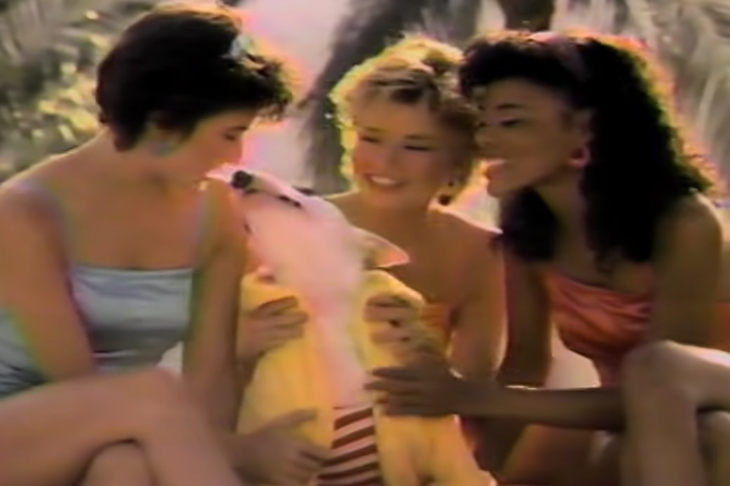Goodbye Spuds MacKenzie, the original party animal and pitch man for Bud Light, the nation’s leading beer.
The most clever ad campaign ever, Spuds debuted during the 1987 Super Bowl game. The nation instantly fell in love with the bold bull terrier in dark glasses and a Hawaiian shirt.
There’s Spuds, looking good in baggies on a surfboard in an ad titled “Hang Twenty.” Now that’s fun, appealing and catchy — and, most importantly, apolitical — in a way that TikTok’s dreary Dylan Mulvaney and Anheuser-Busch’s Alissa Gordon Heinerscheid are not and cannot be.
Spuds’s critics complained that he glamorized underage boozing, but his fans were legion and of all backgrounds. They’re still around, attached to the pre-woke ethos that Mulvaney and Heinerscheid mutually despise.
;768:[300×250,336×280,320×100];0:[300×250,320×100,320×50]”]The ongoing Bud Light debacle might prefigure one of the biggest product busts of all time. It certainly illustrates the crazy to be found inside newly woke corporations and the inclusion strategies of their highly paid image-makers.
What began as a corporate-woke stunt, using transsexual Mulvaney as a partner and attention-getter, went bad, intensifying after a clip from one of those dreadful go-girl podcasts designed to inspire corporate women went viral. In an hour-long interview, Alissa let down her flaps to disparage the brand’s core audience and past, entirely unaware that she comes across as a self- absorbed, Ivy-style bullshit artist.
“It’s like we need to evolve and elevate this incredibly iconic brand. What does evolve and elevate mean? It means inclusivity,” she opined. “It means having a campaign that’s truly inclusive and feels lighter and brighter and different. And appeals to women and to men. And representation, isn’t it the heart of evolution?”
She went on: “We had this hangover, I mean Bud Light had been kind of a brand of fratty, kind of out-of-touch humor, and it was really important that we had another approach.”
This corporate jabber and diversity talk might wow the sisters and woke crowd. It makes many of her actual beer drinkers want to barf.
;768:[300×250,336×280,320×100];0:[300×250,320×100,320×50]”]Born into a high-powered lawyer family with connections extending from Texas to Southern California and the East, she attended Groton, Harvard and then Wharton. Alissa is the ultimate brand manager and Prep-Woke Girlboss.
Alissa talks in fluent psychobabble: the trendy drivel of her finding emotional safe spaces to process her feelings, the listening and empathy, the journey and trials. In this self-scripted narrative, she overcomes uncertainty, hardship and suffering to be the best in her field, catnip for aspiring female managers. She professes to be a beacon, “bringing women along with me and inspiring the next generation of female leaders to keep moving forward and pursue careers in male-dominated industries.”
But does Alissa Gordon Heinerscheid, Anheuser-Busch’s vice president for marketing Bud Light, by far the nation’s biggest beer brand, know her product or her customers? Does she even like them? At least she could pretend.
Alissa seems like she’d be very comfortable kicking back a Deschutes microbrew at the La Jolla Beach and Tennis Club; not so much in some godforsaken tavern off I-90 with one beer on tap, take it or leave it. Bottoms up, honeybunch!
Those icky flyover-country bumpkins in wool shirts packing Bud Light in the cooler for an outing at the lake? They’ve been decades-long brand loyalists. Those so-not-the-future “fratty” beer drinkers at State U — lots of young men wanting to be attractive and athletic, and eager to give off a pleasant vibe to the girls — are heading out the door. They might have been Bud regulars for years to come.
Wrapped in her Groton-to-Wharton bubble, and no doubt schooled in Ibram X. Kendi and Robin DiAngelo, Alissa and her team did not take into account that a large share of the yeoman nation was reaching a tipping point on transsexuality.
;768:[300×250,336×280,320×100];0:[300×250,320×100,320×50]”]The CEO — with an impressive background in the Marines and Central Intelligence Agency — just got diversity-rolled and has absolutely no idea what to do. Inside Anheuser-Busch, there’s now a lot of finger-pointing and blame-shifting, minimizing Mulvaney’s lucrative gig as a company flack and face. Anheuser-Busch has stood its ground, saying only it meant to connect with broader audiences and seeks to bring people together, not divide. But obviously Alissa and her boss were at the helm on Mulvaney.
Alissa herself brings into high relief a broader affliction of American corporate and government culture: a shocking, self-pleased blindness to the mainstream of American life and to the working classes and people who make the nation’s wheels go ’round.
Alissa is a looming corporate problem because thousands of impressionable young women in top business schools and in corporate marketing and public relations want nothing more than to be an Alissa. The Bud Light controversy has hit a media nerve, and not only among Fox viewers. Zany-left California congresswoman and would-be senator Katie Porter — ex-Andover, Yale and Harvard Law — chimed in on Bill Maher. Mulvaney is raising important issues, Porter insists, “while the right is waging these cultural wars.” Porter claims that disproportionate amounts of violence are visited on the transgendered. “They are being attacked,” she said on the show, attributing the reaction to Mulvaney to “male insecurity.”
As the Bud Light disaster unfolds, and whether the boycott is successful or not, the brand is in grave trouble. It could be a marketing catastrophe right up there with New Coke or Ford’s Edsel that “resembled an Oldsmobile sucking a lemon.” It’s a future Harvard Business School case study on how not to do it right.
What is different from New Coke and Edsel? The Bud Light product fail is not one of changed recipes or unusual hood design but is rooted in deeply divisive politics; and not just politics, but in a mad holy war against wit, science and biology.
Goodbye Spuds, rest in peace. Hang Twenty for us all. Everything dies, including once-invincible brands. The guys over at Delta Omicron Gamma still miss you.
;768:[300×250,336×280,320×100];0:[300×250,320×100,320×50]”]
























